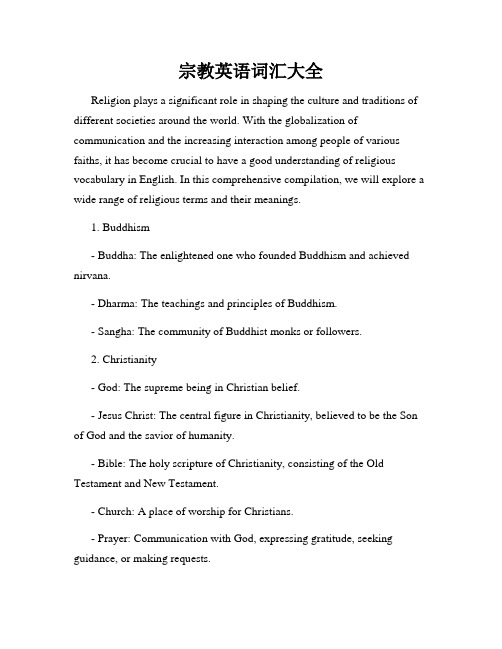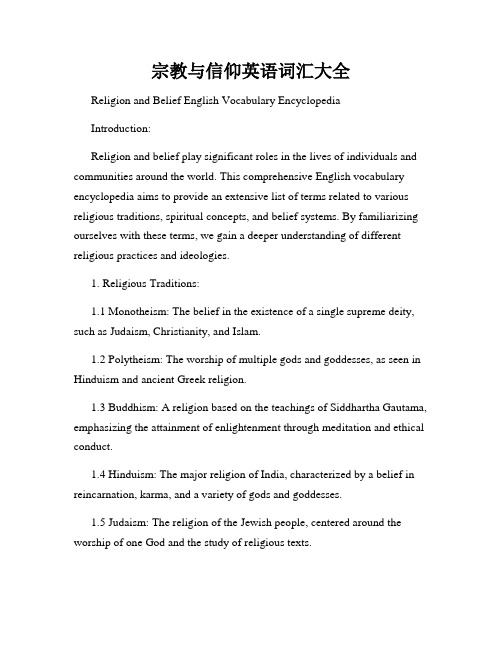Religion-The Only Basis of Society 宗教-社会的唯一基石
宗教信仰最新PPT课件

主张智慧与慈悲。不论是出家或在
家都需要遵守戒律,包括 不杀生 、
不偷盗、不饮酒等。
源自
印度的宗教
佛教
信奉 主张
释迦牟尼 智慧、慈悲
基督宗教
教义 jiàoyì-doctrine 救赎 审判trial
shěnpàn
信仰人口
世界上最多
创世 纪
genesis
信奉 xìnfèng(believe in)
耶稣
主张 zhǔzhāng(view) 爱
公义 救赎
派别pàibié(school) 经典scriptures 活动
天主教
希腊 正教
基督 教
宗教与人类生活
宗教和人们的生活息息相关。宗教的产 生,主要是基于人们 对自然的尊敬 、畏惧 wèijù(fear)或疑惑 ,以及对 生、老、病、死 等人生问题的想法。
世界主要的宗教包括 基督教、伊斯兰教 、佛教、道教等,其目的大多是 鼓励人们向 善。
宗教与人类生活
生活中常可见到教堂或寺庙等建筑物,显示 宗教与人们的生活息息相关。
? 新教为西、北欧及加拿大、美国、澳洲 等民族所信仰 ? 天主教为拉丁民族所信仰 ? 希腊正教则为希腊人与斯拉夫民族 (slavic)的宗教 ? 耶路撒冷(Jerusalem)为基督教的圣地,而 梵蒂冈
(Vatican) 是天主教的大本营
希腊正教是基督宗教 的其中一支派别,圆 形屋顶与十字架是其 教堂的特色。
做礼拜be at church、祷告 dǎogào(pray)、 查经bible study 等为教徒主要的信仰方式。
公义: gōngyì(right sacrifices):有罪必罚 救赎:jiùshú(atonemen)指的是世人所犯
宗教类英文单词

宗教类英文单词Religion: A Journey Through English VocabularyIntroductionLanguage serves as a vessel that carries the diverse aspects of human life, including religion. In this article, we will explore a collection of English words related to religious beliefs, practices, and concepts. Through this linguistic journey, we will delve into the rich tapestry of religious vocabulary and gain a deeper understanding of the cultural significance they hold.1. Faith and BeliefFaith is the cornerstone of most religions, and the English language provides a range of words to express this concept. Firstly, there is "religion" itself, referring to the belief in and worship of a superhuman controlling power. Additionally, the term "theology" encompasses the systematic study of religious beliefs and the intellectual pursuit of understanding the divine. "Devotion" signifies the act of religious worship, often involving rituals, prayers, and meditation.2. Places of WorshipReligious practices often require specific locations known as places of worship. For Christians, a "church" is a common gathering space, where believers come together for communal worship. Similarly, a mosque serves as the central location for Muslims to gather and perform Salah (prayer).Hindus practice their faith in a "temple," while Buddhists engage in meditation within a "monastery."3. Sacred TextsSacred texts are essential in guiding religious beliefs and practices. Christianity has the Bible, which includes the Old and New Testaments, while Islam relies on the Quran. Hinduism draws wisdom from the Vedas and Upanishads, and Buddhists follow the teachings of various sutras, such as the Lotus Sutra. Each of these texts holds great significance and helps shape the lives and moral codes of their respective followers.4. Festivals and CelebrationsReligious festivals and celebrations play a vital role in engaging communities and fostering a sense of togetherness. Christmas commemorates the birth of Jesus Christ for Christians, while Eid al-Fitr marks the end of Ramadan for Muslims. Diwali, known as the Festival of Lights, is a significant event for Hindus, and Buddhists celebrate Vesak to honor the birth, enlightenment, and death of Gautama Buddha.5. Religious Figures and LeadersThroughout history, various religious figures and leaders have emerged, shaping the beliefs and practices of their respective faiths. Jesus Christ is considered the central figure for Christians, serving as the embodiment of divinity and the redeemer of humanity. Prophet Muhammad is the revered messenger in Islam, spreading the teachings of Allah. Siddhartha Gautama, also known as Buddha, is the enlightened one who founded Buddhism.6. Ethics and MoralityReligion often forms the bedrock of ethical and moral frameworks within societies. In Christianity, the Ten Commandments outline a set of moral guidelines, and Islam follows the Five Pillars, which include acts of charity and pilgrimage. Hinduism promotes the concept of Dharma, emphasizing duty, righteousness, and moral responsibilities. Buddhism's Noble Eightfold Path guides adherents in achieving enlightenment through right understanding, intention, and conduct.ConclusionAs we conclude this exploration of religious vocabulary in the English language, we recognize the significant role religion plays in shaping cultures, communities, and individuals. The words and concepts found within religious lexicons serve as a bridge, connecting humanity's spiritual and intellectual pursuits. Through a deeper understanding of these words and their meanings, we can foster greater respect and appreciation for the diverse religious beliefs that enrich our world.。
爱默生简介中英文对照

Early life, family, and education
• Emerson was born in Boston, Massachusetts on May 25, 1803, son of Ruth Haskins and the Rev. William Emerson, a Unitarian minister. He was named after his mother's brother Ralph and the father's great-grandmother Rebecca Waldo. Ralph Waldo was the second of five sons who survived into adulthood; the others were William, Edward, Robert Bulkeley, and Charles. Three other children— Phebe, John Clarke, and Mary Caroline–died in childhood. • The young Ralph Waldo Emerson's father died from stomach cancer on May 12, 1811, less than two weeks before Emerson's eighth birthday.Emerson was raised by his mother, with the help of the other women in the family; his aunt Mary Moody Emerson played an important role. Aunt Mary had a profound effect on Emerson. She lived with the family off and on, and maintained a constant correspondence with Emerson until her death in 1863.
宗教英语词汇大全

宗教英语词汇大全Religion plays a significant role in shaping the culture and traditions of different societies around the world. With the globalization of communication and the increasing interaction among people of various faiths, it has become crucial to have a good understanding of religious vocabulary in English. In this comprehensive compilation, we will explore a wide range of religious terms and their meanings.1. Buddhism- Buddha: The enlightened one who founded Buddhism and achieved nirvana.- Dharma: The teachings and principles of Buddhism.- Sangha: The community of Buddhist monks or followers.2. Christianity- God: The supreme being in Christian belief.- Jesus Christ: The central figure in Christianity, believed to be the Son of God and the savior of humanity.- Bible: The holy scripture of Christianity, consisting of the Old Testament and New Testament.- Church: A place of worship for Christians.- Prayer: Communication with God, expressing gratitude, seeking guidance, or making requests.3. Islam- Allah: The Arabic term for God in Islam.- Prophet Muhammad: The last and final prophet in Islam, who received the divine revelation of the Quran.- Quran: The holy book of Islam, considered the word of God as revealed to Prophet Muhammad.- Mosque: A place of worship for Muslims.- Ramadan: The ninth month of the Islamic calendar, during which Muslims fast from dawn to sunset.4. Hinduism- Brahma: The creator god in Hinduism.- Shiva: The destroyer god in Hinduism.- Vishnu: The preserver god in Hinduism.- Karma: The law of cause and effect that determines one's destiny based on their actions.- Yoga: A spiritual and physical practice aimed at achieving union with the divine.5. Judaism- Adonai: The Hebrew term for God in Judaism.- Torah: The holy scripture of Judaism, consisting of the first five books of the Old Testament.- Synagogue: A place of worship for Jews.- Rabbi: A Jewish religious leader or teacher.- Kosher: A set of dietary laws and restrictions observed by Jews.6. Sikhism- Guru: A spiritual teacher or guide in Sikhism.- Gurdwara: A place of worship for Sikhs.- Guru Granth Sahib: The holy scripture of Sikhism, considered the eternal guru.- Langar: A communal meal served in Sikh temples, open to all regardless of caste or creed.7. Confucianism- Confucius: The Chinese philosopher who formulated the principles of Confucianism.- Ren: The virtue of benevolence and humaneness in Confucianism.- Junzi: An ideal person who embodies moral integrity and serves as a role model in Confucianism.8. Taoism- Tao: The fundamental principle that governs the universe in Taoism.- Yin and Yang: Complementary forces representing opposites, such as light and dark, in Taoist philosophy.9. Indigenous Religions- Shaman: A spiritual leader who mediates between the human and spirit worlds in indigenous religions.- Ancestor worship: The veneration of deceased ancestors in indigenous belief systems.- Sacred: Something regarded as holy or having spiritual significance in indigenous religions.10. New Age Spirituality- Meditation: A practice of quieting the mind and focusing attention, often used for relaxation and spiritual growth.- Enlightenment: Attaining a higher state of consciousness or understanding in New Age spirituality.In conclusion, this extensive list covers the most commonly used religious terms in English. Understanding and respecting different religious beliefs and practices are essential in fostering harmonious interfaith relationships.。
「厄玛乌教学法」简介

+ Constructivist learning 「建構學習」(John Dewey, L. Vygotsky)
+ Narrative knowing 「敘事知識」
(Jerome Bruner)
+ Moral development theory「道德發展階段 論」 (Lawrence Kohlberg)
4. 「厄瑪烏教學法」是什麼?
+ 4.1 聖經中的「厄瑪烏」故事是什麼?
厄瑪烏的故事 (路24:13 – 35)
的你 是們 些走 什路 麼, 事彼 ?此
談 論
纔給候當
認 他 ,就 耶
出們拿穌
耶。起與
穌 來 。
他 們 的
餅 來 ,祝
他 們 坐
眼福下
睛了吃
開 ,擘 飯
了開的
,這 ,遞 時
10 Principles of Emmaus Pedagogy
3. The teacher approaches the students personally.
4. The teacher walks along with the students.
5. The teacher finds out where the students are.
6. The teacher explains from the perspectives of the students.
+ 要求學生不斷將當下經驗與基督徒 故事聯繫
+ 找尋適當機會讓學生將信念轉化成 行動
4.8 「厄瑪烏教學法」的核心理念是什麼?
+ 教會藉著禮儀、標記和文獻傳下來的 「故事」需要在現代不斷重認、理解、 發展,以引導世人走向未來,傳統須 與當下經驗結合
宗教与信仰英语词汇大全

宗教与信仰英语词汇大全Religion and Belief English Vocabulary EncyclopediaIntroduction:Religion and belief play significant roles in the lives of individuals and communities around the world. This comprehensive English vocabulary encyclopedia aims to provide an extensive list of terms related to various religious traditions, spiritual concepts, and belief systems. By familiarizing ourselves with these terms, we gain a deeper understanding of different religious practices and ideologies.1. Religious Traditions:1.1 Monotheism: The belief in the existence of a single supreme deity, such as Judaism, Christianity, and Islam.1.2 Polytheism: The worship of multiple gods and goddesses, as seen in Hinduism and ancient Greek religion.1.3 Buddhism: A religion based on the teachings of Siddhartha Gautama, emphasizing the attainment of enlightenment through meditation and ethical conduct.1.4 Hinduism: The major religion of India, characterized by a belief in reincarnation, karma, and a variety of gods and goddesses.1.5 Judaism: The religion of the Jewish people, centered around the worship of one God and the study of religious texts.1.6 Christianity: The religion based on the life and teachings of Jesus Christ, emphasizing love, forgiveness, and salvation through faith.1.7 Islam: A monotheistic religion founded by Prophet Muhammad, focusing on the worship of Allah and submission to His teachings as revealed in the Quran.2. Spiritual Concepts:2.1 Soul: The immaterial essence or spiritual part of a person believed to live on after death.2.2 Salvation: The deliverance from sin and its consequences, often associated with eternal life or unity with a higher power.2.3 Enlightenment: A state of spiritual awakening and understanding beyond ordinary perception, sought in various Eastern traditions.2.4 Karma: The concept of moral cause and effect, where one's actions in this life determine their fate in future lives.2.5 Nirvana: In Buddhism, the state of perfect peace and liberation from the cycle of birth, suffering, and rebirth.2.6 Meditation: The practice of focusing one's mind to achieve mental clarity, relaxation, and spiritual awareness.2.7 Transcendence: The concept of surpassing ordinary limits or existence, often associated with a higher spiritual realm.3. Belief Systems:3.1 Atheism: The absence of belief in deities or a divine being.3.2 Agnosticism: The belief that the existence of God or the divine is unknown or unknowable.3.3 Secularism: The principle of separating religious institutions and practices from governmental and societal affairs.3.4 Humanism: An ethical stance emphasizing human values, reason, and compassion without reliance on supernatural or religious beliefs.3.5 New Age: An umbrella term for various spiritual and metaphysical beliefs and practices centered around self-improvement, healing, and alternative spirituality.3.6 Paganism: An umbrella term for various nature-oriented and polytheistic religious traditions.3.7 Shamanism: A practice involving communication with the spirit world through rituals and trance-like states, often found in indigenous cultures.4. Religious Practices:4.1 Prayer: A solemn request or communion with a higher power, often performed through words, thoughts, or rituals.4.2 Worship: The act of showing reverence and devotion to a deity or religious entity through prayers, rituals, and ceremonies.4.3 Pilgrimage: A journey to a sacred place or site of religious significance, often to fulfill a spiritual or religious obligation.4.4 Ceremony: A formal religious or sacred ritual performed for specific purposes, such as weddings, baptisms, or funerals.4.5 Ritual: A prescribed set of actions, gestures, or words performed in a religious or spiritual context.4.6 Sacrament: A religious ceremony or ritual, such as baptism or Holy Communion, believed to convey divine grace or spiritual power.4.7 Sermon: A religious discourse or speech delivered by a religious leader during a worship service or religious gathering.Conclusion:The above English vocabulary encyclopedia provides an extensive array of terms related to religion and belief. By exploring the diverse traditions, concepts, belief systems, and practices discussed, readers can gain a deeper understanding of the complexities and richness of religious and spiritual life across cultures and societies. Remember that this list is not exhaustive, and there are countless other terms to discover and explore in the fascinating realm of religion and belief.。
宗教学理论

第三节:宗教分类:原则、属性分 第三节:宗教分类:原则、 形态分类、 类、形态分类、区域分类等
一、分类的原则:1、遵循宗教现象本身的客观性 2、还要抓住宗教现象的本质、普遍的、典型性因素 3、还需进一步分析每一个宗教形态和类型的特殊性 4、还必须把握整个宗教以及各个不同形式宗教的发展、变化的历史 过程。 二、属性分类:自然宗教(自发宗教和原始宗教)和人为宗教 三、类型分类:多神教、二神教、主神教、一神教 四、形态分类:自然宗教、神学宗教和世俗化宗教 五、区域分类:氏族宗教、部落宗教、民族宗教、国家宗教、地区宗 教、世界宗教 六、体系分类;教类、教派、宗派和支派 七、因素分类:按对象分为:大自然崇拜、动植物崇拜、鬼魂崇拜、 祖先崇拜、图腾崇拜、灵物崇拜、偶像崇拜、神物崇拜、神迹崇拜、
是宗教学与哲学的交叉学科它站在信仰之外的立场上从认识是宗教学与哲学的交叉学科它站在信仰之外的立场上从认识论本体论神性论世界观人生观宗教观等各个方面具体论本体论神性论世界观人生观宗教观等各个方面具体地研究宗教的根本问题以确立宗教的定义本质和意义宗教地研究宗教的根本问题以确立宗教的定义本质和意义宗教哲学并不意于在事实上宗教究竟是什么这一问题它作为一种规哲学并不意于在事实上宗教究竟是什么这一问题它作为一种规范性研究更加注重的是一种哲学标准来衡量和评价作为各种宗范性研究更加注重的是一种哲学标准来衡量和评价作为各种宗教的核心结构的信仰观念深入辨析宗教的基本问题和与社会的教的核心结构的信仰观念深入辨析宗教的基本问题和与社会的相互关系是指导宗教学各门分支学科的基础理论学科它影响相互关系是指导宗教学各门分支学科的基础理论学科它影响着宗教学的各项具体研究的基本立场和观点是正确把握宗教本着宗教学的各项具体研究的基本立场和观点是正确把握宗教本质深化宗教研究所比不可少
宗教生活的基本形式

雖然他區分了巫術與宗教,不過在他看來, 這兩者都是利用了同樣的分類方式,將整 個世界劃分為兩個對立的領域,一個領域 包括一切神聖的事物,另一個領域則包括 一切凡俗的事物。 這種分類並不是原始或落後心智之產品, 它本身便是集體生活所創造出來的,但這 兩種事物的異質性十分地絕對,以至於兩 者之間格格不入,如果相互混雜,就會產 生嚴重的衝突,因此乃有禁忌的出現。
宗教生活的基本形式(1992) 宗教生活的基本形式(1992) Les Formes e’l’ementaires de la e’ vie religieuse (1912) The Elementary Forms of Religious Life (1915)
Durkheim, E’mile(1858-1917) E’mile(1858法國學院社會學創始人。 古代或原始社會研究方面最有影響的早期 理論家。 生於法國東北部的一個猶太人家庭。 法國政府封之為國家研究院院士的第一位 法國社會學家。
集體表象(集體表現)
collective representation, shared mental constructs with the help of which human beings collectively view themselves, each other, and the natural world. Totemism as an system of collective representations. 圖騰宗教即是社會的 集體表現系統之一。 Representation: 反映、表現、描繪、陳述、表達、 再現。 Represent: make present (呈現、使出現); (呈現、使出現); symbolize, stand for。在文學或藝術上是符號、 for。在文學或藝術上是符號、 象徵,或是意像、圖像(image),或是呈現在心理 象徵,或是意像、圖像(image),或是呈現在心理 上的一個過程。
- 1、下载文档前请自行甄别文档内容的完整性,平台不提供额外的编辑、内容补充、找答案等附加服务。
- 2、"仅部分预览"的文档,不可在线预览部分如存在完整性等问题,可反馈申请退款(可完整预览的文档不适用该条件!)。
- 3、如文档侵犯您的权益,请联系客服反馈,我们会尽快为您处理(人工客服工作时间:9:00-18:30)。
Religion-The Only Basis of Society
William Ellery Channing (b. 1780, d. 1842)
Religion is a social concern; for it operates powerfully on society, contributing in various to its stability and prosperity. Religion is not merely a private affair; the community is deeply interested in its diffusion; for it is the best support of the virtues and principles, on which the social order rests. Pure and undefiled religion is to do good; and it follows very plainly, that if God be the Author and Friend of society, then, the recognition of him must enforce all social duty and enlightened piety must give its whole strength to the public order.
Few men suspect, perhaps no man comprehends, the extent of the support given by religion to every virtue. No man, perhaps is aware how much our moral and social sentiments are fed form this fountain; how powerless conscience would become without the belief of a God; how palsied would be human benevolence, were there not the sense of a higher benevolence to quicken and sustain; how suddenly the whole social fabric would quake, and with what a fearful crash it would sink into hopeless ruin, were the ideas of a Supreme Being, of accountableness and of a future life to be utterly erased from every mind.
And, let men thoroughly believe that they are the work and sport of chance; that no superior intelligence concerns itself with human affairs; that all their improvements perish forever at death; that the weak have no guardian, and the injured no avenger; that there is no recompense for sacrifices to uprightness and the public good; that an oath is unheard in heaven; that secret crimes have no witness but the perpetrator; that human existence has no purpose, and human virtue no unfailing friend; that this brief life is everything to us, and death is total, everlasting extinction; once let them thoroughly abandon the religion, and who can conceive or describe the extent of the desolation which would follow?
We hope, perhaps, that human laws and natural sympathy would hole society together. As reasonable might we believe that were the sun quenched in the heavens, our torches would illuminate, and our files quicken and fertilize the creation. What is there in human nature to awaken respect and tenderness, if man is the unprotected insect of a day> and what is he more, if atheism be true?
Erase all thought and fear of God from a community, and selfishness and sensuality would absorb the whole man. Appetite, knowing no restraint, and suffering, having no solace or hope, would trample in scorn on the restraints of human laws. Virtue, duty, principle, would be mocked and spurned as unmeaning sounds. A sordid self-interest would supplant every feeling; and man would become, in face, that the theory in atheism declares him to be, -a companion for brutes.。
